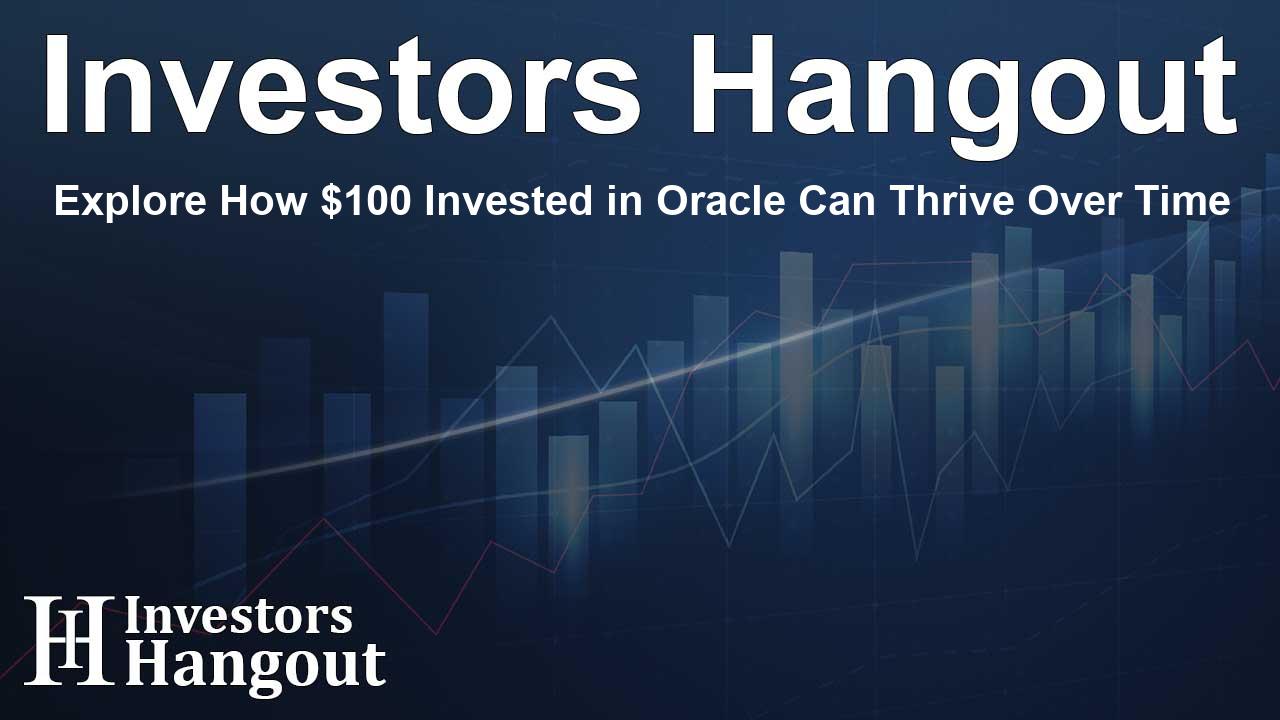Explore How $100 Invested in Oracle Can Thrive Over Time

Your Investment in Oracle: A 20-Year Journey
Oracle Corp (NASDAQ: ORCL) has consistently exceeded market performance over the last two decades, showcasing an impressive annualized return of 13.63%. This is a remarkable achievement, significantly outpacing the market average by 5.3% annually.
Value of a $100 Investment
If you had invested just $100 in ORCL stock 20 years ago, that initial investment would have grown to approximately $1,290.77 today. This impressive dollar amount is based on the current valuation of Oracle’s stock, which stands at $166.22 as of the latest evaluation.
Oracle's Long-Term Performance
Investing in Oracle over such an extended period underlines the pivotal role of compound interest. The growth seen in a relatively small investment over two decades illustrates how patience and strategic investments can lead to significant financial growth.
Why Investing in Oracle Makes Sense
With a market capitalization now sitting at $464.91 billion, Oracle’s stability and growth potential make it an appealing option for current and new investors alike. The company has maintained a strong position within the tech industry, adapting to changes and consistently seeking innovation.
Understanding Compounded Returns
The takeaway here isn’t just the remarkable figure of $1,290.77. It’s about recognizing the power of compounded returns. A long-term perspective on investments can yield surprising and beneficial outcomes, which are essential for anyone considering their financial future.
Continuous Innovation and Growth
Oracle continues to evolve, not only maintaining its standing but also exploring new avenues for growth, such as expanding its cloud services and technology solutions. Investors keen on technology should keep an eye on Oracle and its ongoing developments.
Looking Ahead
As Oracle moves forward, upcoming advancements and product releases could further enhance its appeal to both investors and consumers. This momentum positions Oracle for continued success and growth in the competitive tech market.
Frequently Asked Questions
1. What is Oracle’s average annual return over the last 20 years?
Oracle has achieved an average annual return of 13.63%, surpassing the market average.
2. If I invested $100 in Oracle 20 years ago, what would it be worth today?
Your $100 investment would have grown to about $1,290.77 based on the current stock price.
3. What factors contribute to Oracle's market success?
Oracle's market success is attributed to its innovative products, robust growth strategy, and adaptation to market changes.
4. How can compounding affect investment growth?
Compounded returns significantly increase the growth potential of investments over time, showcasing the benefits of long-term investing.
5. Why might investors choose Oracle in the current market?
Investors may choose Oracle for its established market position, continuous innovation, and strong financial performance, which signals potential for future growth.
About The Author
Contact Olivia Taylor privately here. Or send an email with ATTN: Olivia Taylor as the subject to contact@investorshangout.com.
About Investors Hangout
Investors Hangout is a leading online stock forum for financial discussion and learning, offering a wide range of free tools and resources. It draws in traders of all levels, who exchange market knowledge, investigate trading tactics, and keep an eye on industry developments in real time. Featuring financial articles, stock message boards, quotes, charts, company profiles, and live news updates. Through cooperative learning and a wealth of informational resources, it helps users from novices creating their first portfolios to experts honing their techniques. Join Investors Hangout today: https://investorshangout.com/
The content of this article is based on factual, publicly available information and does not represent legal, financial, or investment advice. Investors Hangout does not offer financial advice, and the author is not a licensed financial advisor. Consult a qualified advisor before making any financial or investment decisions based on this article. This article should not be considered advice to purchase, sell, or hold any securities or other investments. If any of the material provided here is inaccurate, please contact us for corrections.
